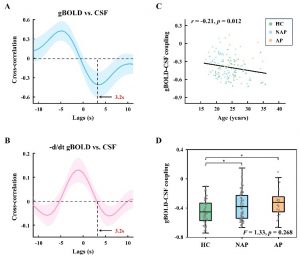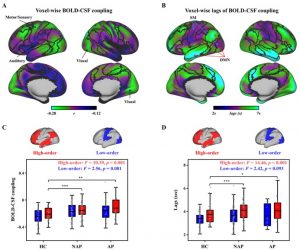A research team led by Yuan Zhen, head of the Centre for Cognitive and Brain Sciences (CCBS) and professor in the Faculty of Health Sciences (FHS) at the University of Macau (UM), has for the first time identified dysfunction in the glymphatic system, the brain’s waste clearance system, among patients with early psychosis. The team also offered a novel neuroimaging biomarker for the early diagnosis and intervention of psychiatric disorders. The research has been published in Molecular Psychiatry, a leading international journal in neuroscience and psychiatry.
The glymphatic system plays a vital role in clearing metabolic waste and maintaining neural health. Previous studies have shown that dysfunction of the glymphatic system is closely linked to neurodegenerative diseases such as Alzheimer’s and Parkinson’s. However, systematic studies and clear evidence on its involvement in psychiatric disorders, particularly in early psychosis, are lacking.
In this study, the research team analysed multimodal MRI neuroimaging data from 137 participants aged 16 to 35. These participants included healthy controls, individuals with non-affective psychosis, and individuals with affective psychosis. The team measured the coupling between the cortical blood-oxygen-level-dependent (BOLD) signal and the ventricular cerebrospinal fluid (CSF) flow, which served as a biomarker for the brain’s waste clearance efficiency.
The results showed that BOLD-CSF coupling was significantly weakened and delayed in patients with early psychosis, suggesting glymphatic dysfunction. Patients with affective psychosis exhibited the most pronounced abnormalities, indicating that their glymphatic systems may be impaired at an early stage of the disease (Fig. 1). Further analysis revealed that reduced BOLD-CSF coupling correlates with declines in fluid intelligence, concentration, working memory, and language skills, as well as higher anxiety levels. The reduced BOLD-CSF coupling may also be closely related to sleep disorders and chronic inflammation, which are commonly associated with psychosis, reflecting the condition’s extensive impact on the glymphatic system.
The study also found that the dysfunction was most pronounced in high-order cognitive networks (e.g. default mode and frontoparietal networks), while lower-order sensory and motor regions (e.g. visual and somatomotor networks) were less affected. This suggests a ‘top-down’ pattern of impairment in early psychosis (Fig. 2). This pattern indicates that psychosis may first damage the brain regions responsible for complex cognitive processing before affecting the regions responsible for sensory processing.
In addition, the proposed BOLD-CSF coupling index demonstrated high stability and reproducibility across multiple independent datasets (Fig. 3), showing strong reliability across different platforms and populations. It will be a promising neuroimaging biomarker for psychiatric disorders, which can enhance early detection, disease progression monitoring, and therapeutic response assessment, thus improving the objective and quantitative diagnosis and intervention of psychiatric disorders.
The corresponding authors of the study are Prof Yuan and Zhao Zhiying, research assistant professor in CCBS. The first author is doctoral graduate Hua Lin. Doctoral graduate Zeng Xinglin and master’s graduate Zhang Kaixi also contributed to the study. The research was funded by the Science and Technology Development Fund of the Macao SAR (File No.: 0014/2024/RIB1 and 0015/2023/ITP1), and UM (File No.: MYRG-GRG2023-00038-FHS and MYRG-GRG2024-00259-FHS). The full version of the research article is available at: https://doi.org/10.1038/s41380-025-03058-1.
| Source: Institute of Collaborative Innovation | |
| Media Contact Information: | |
| Communications Office, University of Macau | |
| Albee Lei | Tel: (853) 8822 8004 |
| Bell Leong | Tel: (853) 8822 8009 |
| Email: | prs.media@um.edu.mo |





